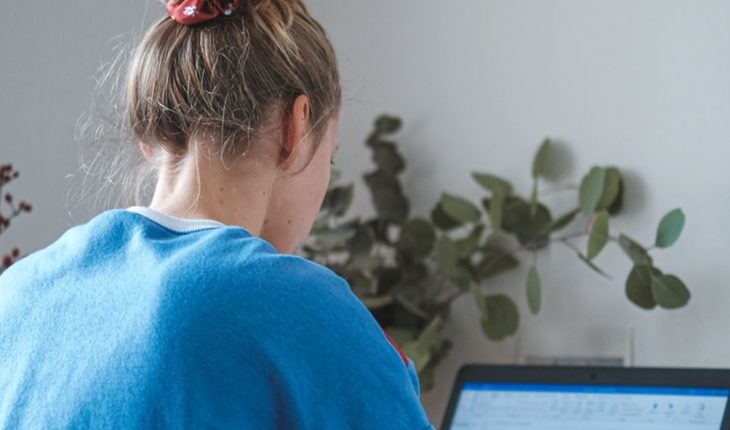Since the coronavirus came to our country and social isolation was declared to prevent spread, our routine has changed abruptly. No more family roast Sundays, nor on Saturdays to go out with friends, nor on after-office Thursdays with those of the laburo. No shopping malls, no cinemas, no walking around the square. Everything that helped us get rid of the work routine, we don’t have it anymore. Switched to WhatsApp video calls with our family to see our dog and to eternal Zoom chats with friends to “catch up” (even if we’re locked up, there are always things to tell). But it also changed that work routine that we wanted to get away from in our spare time. Those of us who are lucky enough to keep working, we had to adapt to work from home. Instead of sharing my desk with my friends at work, I now work with my boyfriend from the dining table. From a 30-person editor where there were cameras, interviews and people circulating all the time, I went on to be in my living room in jogging and crocs.
There are many of us who are like this and in Filo.news we talk to several people who work from their home so that you feel accompanied by this new modality: from a psychologist and a lawyer from a prosecutor’s office, to a hockey teacher and a publicist. The home office for businesses
While many of us try to adapt to this modality, the companies are also doing so: “There are companies that were able to quickly establish a policy and procedures to interact and work like this and others that are trying to find their modality,” explained Gisella Dobal, director of the networked talents consultanc. Another aspect highlighted by the psychologist and labour adviser is the change in the “vision” of the organizations with regard to the home office: “There are companies that doubted this modality and were reluctant and this put them to the forcibly tested”. Among the benefits for employers is cost reduction and dobal also highlights the “possibility of being more time with the family.” On the side of the disadvantages of this modality, the professional highlighted “the lack of face-to-face interaction, the sharing of moment with colleagues who are in the same way”. In the list of negative aspects there is also the “impossibility of disconnecting from work issues, not having the tools of work, etc.”.
Empty Offices quarantined-Photo: Unsplash illustrative image
“For companies, as well as missing conflicts due to the physical absence of employees, other situations appear to resolve: how to communicate, what to demand, what extra benefits they should give, among other issues. From Human Resources, dynamics must be rethought and new strategies come forward,” she said. Working from home
Carolina (27) holds a Bachelor’s degree in Psychology and works in several practices. “My days were about going to the office and caring for patients all day,” she told of her usual routine before quarantine. Two years ago he started with a project to attend remotely through video calls because he considers it to be “the therapy of the future”, although he had few sessions and gradually was abandoning it. But this type of therapy is indispensable right now. When the quarantine started I was disoriented as I had to incorporate new “intervention strategies with each patient”: “I attend children and some have disabilities, with them I had to think of new alternatives”. But she found her around and is now more bearable to her, her patients and continues to enjoy her profession. The negative aspect you find in this is that younger patients don’t have the same privacy as in the office: “When there are family members nearby, I look to work on other areas, such as social skills,” explained the psychologist in dialogue with Filo.news.
Gustavo (35) is an accountant and has two children. Before quarantine he worked from 9 to 17 hours in an accounting studio half an hour from his home by public transport. Since the quarantine began in mid-March, he “moved” his computer and the printed documents he was going to need. “The change was very difficult, not just because of ‘the move’ … there were also some changes to tax levels and things were also complicated for some customers due to a lack of business,” he explained. Being at home is nice because I save my travel time to the studio and I can be with the guys… but it’s also complicated because they’re 5 and 8 years old, so they demand time and attention,” he said, adding about his routine: “I’m still starting at 9, but I end up only when I go to sleep. There are many distractions throughout the day.” After this experience, Gustavo would like to incorporate the home office once a week and believes he could organize himselfr. Lucia (24) runs the social media of a music theatre school and helps teachers in classes. Network management continues to do so all day, with no defined schedule, as before quarantine. But now the classes are given online: “There are students who are still having a hard time adapting to the platform.”
• G As • APRIL IS ONLINE IN THE @TALLERDETEATROMUSICAL —————————————————————— HOW DO I TAKE CLASSES? By “Zoom”, a safe and free app. We recommend using the compu and not the celu. It’s a very simple app to download, but we recommend doing it in time so you don’t waste class time. -in case you have problems or do not know how to download it, send us a message and we help you. Choose the means of payment you prefer (bank transfer or paid market). Make such payment and send by whatsapp (+54 9 11 2389-3406) the voucher. You will receive a link that will help you to enter the class at your schedule, throughout the month of April. —————————————————————— WHEN DO I TAKE CLASSES? During regular class hours: •Peques: Tuesday 17:30-18:30 hs. •Junior: Tuesday 18:30-19:30 hs. •Teens: Tuesday 19:00-20:30 hs. •Adults: Tuesday 20:30-22:30 hs. —————————————————————— WHERE DO I TAKE CLASSES? In our houses! Look for a space with good Wi-Fi. I asked for permission and help to run the furniture so you can dance without hurting yourself. —————————————————————— we lower the price of our classes. So no one stays outside. $800 per month Payment is payable by bank transfer or payment market (ask privately for payment details). —————————————————————— SUBIMOS material complementary to Google Classroom. Vocalizations, tracks, lyrics and videos, so you can practice whenever you want. —————————————————————— WE MAINTAIN energy, fitness, technology and love. Because doing what makes you happy is also taking care of your health. #tallerdeteatromusical #comediamusical #haceloquetehacefeliz #teatromusicalniños #comediamusicalniños #comediamusicalinfantil #comediamusicaladolescentes #teatromusicaladolescentes #comediamusicaladultos #teatromusicaladultos #canto #danza #teatro #comediamusicalquilmes #teatromusicalquilmes #clasesdeteatro #clasesdedanza #clasesdecanto #clasesdecomediamusical #clasesdeteatromusical #clasesdecomediamusicalquilmes #clasesdeteatromusicalquilmes #aprenderteatro #aprenderdanza #aprendercanto
A shared publication of T’T Ms (@tallerdeteatromusical) on 12 Apr 2020 at 6:23 PDT
“Exercises have changed, it’s inevitable. The theater is characterized by the live, being on stage and now doing it through a screen is rare…”, he mused and added: “We are finding it around. Musical theatre does very well: dancing and singing changes our energy!” Ana (26) is a physical education teacher: she works in three schools and is a physical hockey coach and trainer at Quilmes Atlético Club (QAC). He has his own training group (RUiN Team) working in a Plaza de Quilmes. “At first I liked it because I could rest at home and not be going back and forth. But it’s becoming increasingly difficult to move physical activity across the screen,” he said.
Training in the square-Photo: Anne’s kindness
“Not everyone manages to do the exercises, they don’t train with the same intensity. I miss being in touch with my students and players. One tries to adapt to these conditions, but in my profession it is quite complicated”, reflected Ana, who also plays hockey in the same club.Milagros (24) is a publicist in Havas and since before quarantine had already incorporated a day of home office every two weeks with the same schedule: from 9 to 18hs. The only counter that finds him to work from home is that he doesn’t have the benefits of the company like the dining room, for example.” I live away from the office so now I don’t have the stress of driving up there and I’m more rested when it comes to work,” Miracles said of the home office benefits during quarantine. Other positives he finds is that meetings are more effective because everyone is more focused, learned to make virtual presentations and that will serve them in the future and there are online trainings that are saved and can access them when they need them.
Florence (24) is a lawyer and works in the Public Prosecutor’s Office of the City of Buenos Aires. Statements are received from whistleblowers, witnesses and defendants, protective and evidence measures are entrusted, resolutions are written, and other tasks. The working day is Monday to Friday from 8 to 15hs, “always extends”, he added. The way the home office is not incorporated into the prosecutor’s office, but Florence believes that “it could be done once a week or every fortnight”: “You could take that day to write resolutions. That’s what you need to be more focused on and there’s a lot of disruption at work.” From home, he explained that “it is easier to contact victims or those reported because they are usually at home” and also stressed that “computer systems were enabled to work remotely, before they could not.” But the scale tilts to the negative side of the home office: “At first they asked you for things outside of business hours, while you’re working you have to do household chores that can be deconcentrated, if you have to consult something with a boss it’s hard to get in touch,” he listed.
One of the risks that arises in this work is that everyone has to use their work tools (computer and phone, for example): “I have to use my personal cell phone to talk to victims or to the police. Besides that the account is paid me, they have that contact number left to people and sometimes they send messages at any time,” he said from his cell phone that he had to take his WhatsApp profile picture.” I am Agustina (24) and I have a degree in Journalism. Since I started working at Filo.news (almost three years ago) I do home office on Saturdays. I always thought it was a good way to work, although on weekends we always have a lot more to do and we didn’t stop for a minute, really. But it was a working day that I didn’t have to travel by public transport to the newsroom and I could be with my family, my dog or my boyfriend’s family in Mar del Plata. What I always had in mind was that when I finished my work hours, I shut down the computer and I was where I wanted to be.
The writing of Filo empties during quarantine-Photo: gentileza Rocío García
It’s been more than two months since Tuesday to Saturday is the same routine. What makes me more connected to the work environment is making video calls with my colleagues and realizing that I’m not alone in this. I think when we get back to normal, the home office is a good way to work in a more enjoyable environment some days a week. But the important thing is to know when to stop: have fixed schedule or meet daily (real) goals. Just because we’re home because of the pandemic doesn’t mean we’re always available to work, and that should all be understood: employees and employers.
The psychologist Fernando Tarnogol gives us some advice so that our working days do not become eternal and stressful days. Dress comfortably. Don’t stay in your pajamas or underwear. This gives the feeling that all day (week and month) becomes the same thing. This will help differentiate moments and tasks during the day.
Organize so you don’t have to work until after hours to keep work and leisure times discriminated against
Take breaks when you feel like you’re having a hard time concentrating or are reading the same line several times.
Assemble your “work area” facing a window or place overlooking the outside to reduce the feeling of lockdown.
It will cover the most complex, more mechanical or less rewarding topics at the beginning of the working day. Those who require more creativity for the second part of the day, after lunch or when you are invaded by the urge to nap and leave the most light or simple issues for the end of the day when you are already tired or saturated.
We’re already over two months quarantine and at some point we all feel distressed, angry, alone or sad. Some find it hard to sleep, while others feel tired all the time. We are living strange times and it’s normal to feel different. You’re not alone, we’re all going through this quarantine and this effort is to take care of each other. If you have a job and can do home office, stay at home and follow the advice given by professionals to feel better mentally and physically. In this note:





